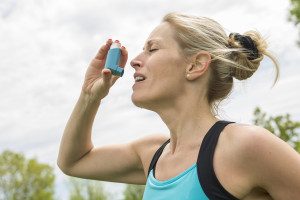This entry was posted on Monday, November 20th, 2017 and is filed under Blog by AENT Associates
Fifteen minutes into your morning run, your legs start to feel heavy and your chest tightens. Unwilling to quit, you push yourself harder – too hard – and before you realize what’s happening, you’re doubled over, coughing and struggling to catch a deep breath. You try to walk it off, but it takes a good half hour until you feel normal again. As you recall the ordeal later in the day, it sends a chill up your spine, and you’re certainly not looking forward to another run anytime soon.
If you’ve ever had a similar experience, you may be dealing with a condition called exercise-induced bronchoconstriction (EIB), formerly called exercise-induced asthma. Read on to learn the basics about what EIB is, how it’s diagnosed and how to prevent future attacks.
What are the Symptoms of Exercise-Induced Asthma?
EIB has a long name, but it simply means that you’re experiencing tightness of your airways, which makes it hard to breathe. This can occur several minutes into or after the workout, and you may notice second-wave symptoms up to a day later. EIB symptoms include:
- Coughing
- Wheezing
- Chest tightness or pain
- Shortness of breath
- Abnormal fatigue or sluggishness
- Long recovery time after workout
- Negative change in athletic performance
What is the Cause of EIB?
Confusingly, exercise-induced asthma is not actually “caused” by exercise, which is why EIB is the preferred term. Doctors don’t know the exact cause, but they believe EIB occurs when your respiratory tract has an inflammation response and mucus production brought on by exercise and the following triggers:
- Dry or cold air
- Air pollutants like smoke
- Allergens like pollen
- Chlorine exposure from swimming
- Extended periods of heavy breathing, especially from long distance exercise
If you already have asthma, there is a high chance you will experience asthma symptoms after exercise.
How Can I Tell If I’m Out of Shape or If I’m Experiencing EIB?
Sudden heavy exercise will jolt your system if you’ve been living a sedentary lifestyle. Your body will need time to rebuild the muscle and respiratory strength that has been lost due to inactivity, and in the meantime, you could experience symptoms similar to EIB. The only way to tell if you truly have EIB or are simply adjusting to your new exercise routine is to visit an asthma specialist.
How Does the Doctor Know If I Have EIB?
To establish baseline respiratory function, the doctor will have you breathe out as hard and fast as you can into a tube-like device known as a spirometer. You will repeat this a few times and may even get to watch the spike on the monitor as you exhale. After that, you will complete a strenuous exercise, like running on a treadmill, or you will be given something to inhale that mimics the effects of exercise on your body. The doctor will likely test your breathing both during the workout and right after so they can compare your breathing at rest to your breathing while exercising. They may also have you try an inhaler or conduct additional tests.
Can I Still Exercise If I Have EIB?
Absolutely, and you should continue, unless you have another condition that precludes you from exercising. Regular exercise prevents disease and combats obesity, a condition that puts you at risk for diabetes, heart disease and stroke. It also builds up your general respiratory strength.
If you are an all-star athlete, an avid marathoner or someone who loves the outdoors – worry not. You will likely return to these activities full force with the proper medication. There are even some Olympic athletes with EIB, and despite the setback, they are champions in their sport.
To exercise safely, you will need to take the medication your doctor has prescribed, in the way they have prescribed. For instance, if the medication is for daily or pre-workout use, use it daily or before your workout, not just during strenuous exercise after symptoms have already appeared. You should also take the following precautions:
- Warm up for several minutes before the workout
- Keep track of how your body responds before, during and after the workout, noting any symptoms to share with your doctor
- Breath in through your nose to warm and moisten the air before it hits your airways
- Cover your nose and mouth in dry or cool conditions, like during a jog on a crisp fall day or when hitting the slopes on a chilly winter morning
- Stay indoors on high-pollen days, especially in spring
- Avoid exercise when your respiratory system is under stress from sickness or allergies
- Bring a cell phone and a backup inhaler in case of emergency
Get Tested for Exercise-Induced Asthma at Allergy & ENT Associates
If you or a loved one has difficulty breathing during exercise or is experiencing an unexplained decline in athletic performance, it may be time to get tested for exercise-induced asthma. With certification by the American Board of Allergy and Immunology, you can trust the specialists at Allergy & ENT Associates to accurately diagnose your respiratory issue and prescribe the medication you need to get back on your feet. Call us at (713) MY-SINUS to schedule your appointment today!


